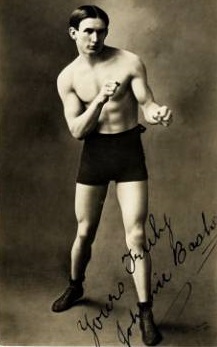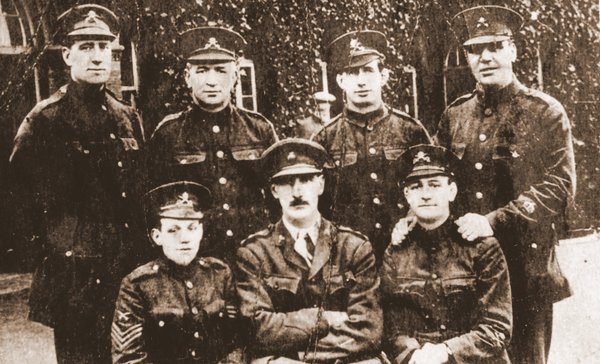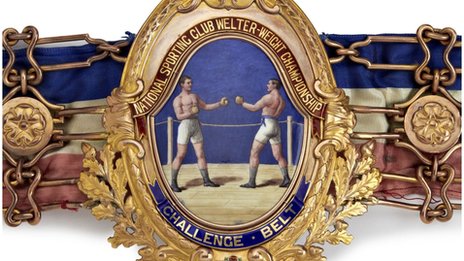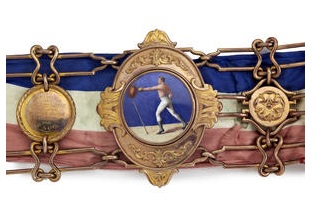
Recently Rated:
Stats
One of the great Welsh fighters who is all too often forgotten is Johnny Basham of Newport, the 'Happy Wanderer' who became the welterweight British champion, joining his fellow countrymen, Jim Driscoll, Tom Thomas, Freddie Welsh and Jim Driscoll who had also earned Lonsdale Belts at their respective weights.

By the time his career ended he had won the British and the European championship at two different weights. Like so many boxers from South Wales, Basham first found his punch on the boxing booths that would travel around the country, after proving himself a capable scrapper on the streets of Newport. Known for his elegance and artistry as a ring stylist, Basham was a close friend of 'Peerless' Jim Driscoll, and both would travel great distances in WW1 to entertain the troops stationed throughout France with displays of their boxing prowess.
 Johnny Basham in WW1 Boxing Squad (2nd from right, back row). Jimmy Wilde (front row left) and Jim Driscoll (front row right) can also be seen in the picture
Johnny Basham in WW1 Boxing Squad (2nd from right, back row). Jimmy Wilde (front row left) and Jim Driscoll (front row right) can also be seen in the picture
In later years, after his career in the ring had passed, Johnny Basham struggled to find an alternative to boxing and fell on hard times. Never one to wallow in his misfortune, he remained a upbeat and likable character known for his love of a good joke. The people of Newport did not forget Johnny's days of glory, and in 1947 a boxing tournament was arranged in the hope that the proceeds of the event would provide Johnny with a pension.
 Johnny's Lonsdale Belt - could belong to Wales for 30,000
Johnny's Lonsdale Belt - could belong to Wales for 30,000
Sadly, just a week before the tournament, Johnny Basham died, with a huge crowd turning out for the funeral. Sufficient funds were not available to mark Johnny's grave in a manner befitting such a great champion, and his resting place was marked with a simple wooden cross for forty years.
In 1987 a boxing tournament between Newport and its German twinned town Heidenheim helped raise the money for a headstone.

The Lonsdale Belt, which was awarded to Basham in 1914, 1915 and 1916, was auctioned at Bonhams Sporting Memorabilia sale yesterday in Chester, but failed to reach its reserve price of 30,000.
It seems a shame that this information does not seem to have reached any Welsh institution that might have been able to raise the funds to purchase the belt so that this amazing piece of Welsh boxing history could remain in the country and be viewed by the public, possibly the National Museum of Wales or possibly the Newport City Council to be put on permanent display in Johnny's hometown. Until recently the only other solid gold Lonsdale belt in Wales that could be viewed by the public was that of Jimmy Wilde, which was displayed at the St. Fagans museum in Cardiff.
JOHNNY BASHAM IN TRAINING
Jimmy Wilde - The Greatest Fighter of All Time ?
If you ask any boxing fan who they believe the greatest boxer of all time to be, some will prove endlessly popular draws - Muhammad Ali, Jack Johnson, Mike Tyson. Everybody has their favourites, but if you're talking pound for pound, and probably the hardest puncher the world has ever seen, one name stands head and shoulders above the rest, Jimmy Wilde, the ghost with the hammer in his hand. There will never be another one quite like him, born in Quakers Yard, South Wales in 1892, Jimmy began scrapping as a boy, and before he turned professional had beaten hundreds of opponents, many nearly double his size.
This in itself wasn't hard, for Jimmy's fighting weight was just 6st 10lbs. Whenever he entered the ring men laughed or abused the promoters, scared that this scrawny waif would get battered beyond recognition, maimed or even killed. By the time the bag of bones had finished his boxing career he was champion of the world, for years the biggest boxing celebrity in Europe (and the highest paid), the full list of his victories will never be known, Jimmy guessed he beat 864 - it's a good a guess as any. He was only beaten 4 times. On both sides of the Atlantic he became a legend.
HITTING AND STOPPING, HOW I WON 100 FIGHTS by Jimmy Wilde
Authorised Official Edition by PeerlessPress
Last year I decided it was important that we remember some part of the Jimmy Wilde phenomenon and to this end, I sought permission from the family of Jimmy Wilde to republish his first book, in which Wilde writes of his thoughts on boxing and the techniques that ensured that he won his first hundred fights by way of knockout.
The result is 'Hitting and Stopping, How I Won 100 Fights' which contains the original text of the book and much additional material and rare photographs. The book is currently available from amazon.co.uk in limited numbers, although I am making a special offer for those that would like to purchase a book from within the UK, and am making it available for 12.99 directly to customers with FREE shipping to anywhere in the United Kingdom.
If you are interested in securing a copy of this classic boxing book by Jimmy Wilde, please emailme at :
peerlesspress@gmail.com .
The book is also available for sale to buyers outside the UK, although shipping must be paid for for all non-UK orders. Email for detailsand shipping costs to your location.
A review of the book courtesy of Tracy Callis, the US based boxing historian of the International Boxing Research Organisation (IBRO) is below :
BOOK REVIEW by Tracy Callis - International Boxing Research Organisation
HITTING AND STOPPING - HOW I WON 100 FIGHTS By Jimmy Wilde
This book, HITTING AND STOPPING- HOW I WON 100 FIGHTS, about the fabulous flyweight champion, Jimmy Wilde, is an interesting and informative read. It has chapters written by the champ himself revealing his views and secrets of fisticuffs in the roped square. There are two major parts. The first has a preface, a very descriptive (wonderfully informative) introduction by Lawrence Davies, who edited the work, and the four chapters by Jimmy Wilde that entail 98 pages. The chapters are entitled Get In And Get Away, On Hitting, On Stopping, On Damaged Hands And Back Hand Punches.
After this is an Addendum that contains two works written by Jimmy that are named The Secret Of My Success and My Greatest Battle. Also, there is an article, How Wilde Developed His Skill, by Jim Driscoll and a work named Tales Of The Tylorstown Terror by Charles Barnett, a Welsh referee who officiated over many of Wilde's contests. Then, there is a brief section with Expert Opinions on Jimmy Wilde as a fighter. The men expressing their views of Jimmy as a fighter are Harold Alderman, J.G.H. Lynch, Fred Dartnell, Ted Lewis, Trevor Wignall, A.F. Bettinson and B. Bettinson, Charlie Rose, Denzil Batchelor, Viscount Knebworth, Eugene Corri, James Butler, Gilbert Odd, Norman Clark and Reg Gutteridge. This is a most knowledgeable collection of historians and boxing men evaluating one fighting man, but what a fighting man ! Jimmy's physical measurements follow this and then the career ring record of the man most often ranked as the greatest flyweight in boxing history is included at the end.
The book is easy reading with conversations, fight talk, boxing philosophy, fighting tips and instruction along with illustrated fight positions in rare photos of Jimmy.
All boxing fans know about the hitting prowess of Wilde. The amazing thing is just how he mustered the blasting technique with such a thin and non-muscular body. Nat Fleischer called him the #1 Flyweight in boxing history. Mike Casey, that splendid boxing historian and writer also identified Jimmy as the greatest flyweight in history. Gene Tunney called him "the greatest fighter I ever saw" and The Ring rated him as the #3 greatest puncher of all time.
Lawrence Davies is a Welsh boxing historian and author of the book 'Mountain Fighters, Lost Tales of Welsh Boxing' (Peerless Press, 2011), which explores the history and origins of the bare knuckle prize ring in Wales.
Here is a preliminary blurb :
For the first time in over half a century, Hitting and Stopping, the first book written by Jimmy Wilde, Flyweight Champion of the World has been re-published as a new, updated and expanded official edition :
'Jimmy Wilde was one of the greatest fighters the world has ever seen. He fought hundreds of times on the fairground boxing booths while still in his teens, often battling opponents nearly twice his size. Wilde went on to win his first 100 professional fights, most by way of knockout and defeated much larger men throughout his professional career. By 1916, Jimmy Wilde was universally acknowledged as the Flyweight Champion of the World, and held the title until 1923.
Wildes devastating punching power was such that he is regarded by The Ring magazine as being the third greatest puncher of all time. Boxing historian Nat Fleischer rated him as the No. 1 Flyweight in boxing history.
Jimmy Wilde was inducted into the International Boxing Hall of Fame in 1990 and is today celebrated as one of the most gifted fighters to have stepped into the boxing ring. First published in 1914, Hitting and Stopping reveals the combative insights of a true boxing master. Jimmy Wilde explains the unorthodox methods and strategies that enabled him to emerge victorious on hundreds of occasions. Illustrated by many rare instructional photographs of Wilde demonstrating his techniques, this book is a must for any sports historian or boxing student hoping to understand the life and career of a man who was called The Ghost with a Hammer in his Hand due to his devastating punch and his uncanny skills in evading his opponents.This new official edition of Hitting and Stopping How I Won 100 Fights contains further additional written material and commentary as well as numerous photographs of Jimmy Wilde that have not been included in any previous edition.
Hitting and Stopping, How I Won 100 Fights by Jimmy Wilde Peerless Press
160 pages, softcover
Numerous photos, expert opinions of Jimmy Wilde, career record of Jimmy Wilde
ISBN : 9780957034211
Price: 12.99
This is interesting, informative and worth reading. Boxing fans who read this book will not be disappointed!!!
HITTING AND STOPPING HOW I WON 100 FIGHTS By Jimmy Wilde Review courtesy of Tracy Callis, Historian, International Boxing Research Organization
I wonder if I might put the feelers out amongst americymru members (and beyond) for assistance. I wrote a book on Welsh boxing entitled 'Mountain Fighters, Lost Tales of Welsh Boxing' in 2011, which tried to uncover some of the history of Welsh fighters (mainly bareknuckle) that were mostly active around the turn on the century, known as 'mountain fighters'. The vast majority of these men have been forgotten, although there are some accounts in early Welsh papers relating to the more locally famous (or infamous) fighters. Some only receive mentions in later newspapers after they died -when it is related that 'veteran pugilist' so-and-so jones died..'
Since writing the mountain fighters book I am attempting to gather together information on later boxers up until the end of the second world war in the hope of releasing a further book on the later history of Welsh boxing. There are lots of prominent fighters from this period, some are fairly well known, like Jim Driscoll of Cardiff,Freddie Welsh of Pontypridd, Tom Thomas of Penygraig and Jimmy Wilde of Tylorstown, but I am also very interested in the much less well known men.
I would be grateful for any references or information on any of the Welsh boxers of the first part of the 20th century, and am hoping that readers of this post might have old photographs, postcards, or further information about any welsh fighters or relatives in old drawers, photo albums, or newspaper clippings or references, to be featured or used in compiling the book, credit for all pictures received will be attributed to the owner. Any information regarding these great welsh sporting heroes will be greatly received, no matter how small, sometimes the slightest clue as to their movements, even grave references, can help with trying to trace further details. I will be happy to share the information I am collecting on these fighters with any family members or interested parties, and try to assist relatives with finding out more about their relatives when possible.
It would be a fairly long if not impossibly boring post to include all the names of Welsh boxers from the period in which I am studying - (about 1800 - 1950) but just to throw a few more well known names out from all areas of wales and times, 'boyo' driscoll, badger o'brien (maurice), john o'brien, billy eynon, redmond coleman, dan thomas - dan 'pontypridd', billy fry, johnny basham, jimmy wilde, dai roberts, percy jones, morgan crowther, frank moody, dave peters, george (young) dando, eddie morgan, sid (syd) russell, llew probert, darkie thomas, bill beynon, jim courtney, leslie williams, david john bowen, dai davies - 'young chips', llew edwards, gordon cook, johnny vaughan, george 'punch' jones, jack jones, lewis roderick, phineas john, cuthbert taylor, billy morgan, etc. etc. etc. to name just a handful.
Have attached a few photos of some old time welsh boxers, just for nostalgia's sake, although these are low res internet images - and would very much like to be able to take copies of original photographs for use in the book if possible. Please feel free to contact me via americymru
thank you, Lawrence Davies

Dai Roberts (Caerau)
eddie morgan (merthyr)
frank moody (pontypridd)
freddie welsh (pontypridd)
jim driscoll (cardiff)
For the first time in over half a century, Hitting and Stopping, the first book written by Jimmy Wilde, Flyweight Champion of the World, and arguably Britain (and Wales) greatest boxer has been re-published as a new, updated and expanded official edition. Previously this book was only available in its original form and cost upwards of 50. If you are a Welsh boxing fan, or want to find a great book for a boxing fanatic for Christmas it doesnt get better than this. Packed with rare photographs, bibliographical information and commentary, this is likely to be a highly sought after book amongst boxing enthusiasts :
'Jimmy Wilde was one of the greatest fighters the world has ever seen. He fought hundreds of times on the fairground boxing booths while still in his teens, often battling opponents nearly twice his size. Wilde went on to win his first 100 professional fights, most by way of knockout and defeated much larger men throughout his professional career. By 1916, Jimmy Wilde was universally acknowledged as the Flyweight Champion of the World, and held the title until 1923.
Wildes devastating punching power was such that he is regarded by The Ring magazine as being the third greatest puncher of all time. Boxing historian Nat Fleischer rated him as the No. 1 Flyweight in boxing history. Jimmy Wilde was inducted into the International Boxing Hall of Fame in 1990 and is today celebrated as one of the most gifted fighters to have stepped into the boxing ring.
First published in 1914, Hitting and Stopping reveals the combative insights of a true boxing master. Jimmy Wilde explains the unorthodox methods and strategies that enabled him to emerge victorious on hundreds of occasions. Illustrated by many rare instructional photographs of Wilde demonstrating his techniques, this book is a must for any sports historian or boxing student hoping to understand the life and career of a man who was called The Ghost with a Hammer in his Hand due to his devastating punch and his uncanny skills in evading his opponents.
This new official edition of Hitting and Stopping How I Won 100 Fights contains further additional written material and commentary as well as numerous photographs of Jimmy Wilde that have not been included in any previous edition.
160 pages
ISBN : 9780957034211
12.99
Email peerlesspress@gmail.com for more information and to order your copy direct from the publisher. Peerless Press ships worldwide.
Shipping :
United Kingdom : 2.80
Europe: 4.10
World Zone 1 : 6.10
(North America, South America, Africa, Middle East, Far East & S. East Asia)
World Zone 2 : 6.30
(Australia, New Zealand, etc)
If ordering from outside the United Kingdom, to check which World Zone your country falls into please check the following link :
Royal Mail Worldwide Zones 1 & 2 Country List
The Mighty Atom - 94lb soaking wet - one of the greatest Welshmen the world has ever seen
By Lawrence Davies2, 2012-10-01
Some sporting heroes live for just an instant, a single moment of glory. Others sparkle for awhile and give us opportunity to marvel at their skill. A select few endure for all time. Over a century after a wafer thin, stick like teenager appeared on the front of a fairground boxing booth in South Wales, it is still hard to conceive of the genius of Jimmy Wilde. Some say Muhammad Ali was the greatest, others maybe Sugar Ray Robinson, but no matter how far back you go, it is all but impossible to find a man that could do what the Mighty Atom did.
Jimmy was a mere 6st or therabouts when he first started fighting, a bag of bones and a tight tarpaulin of skin. Some laughed, others protested. How on earth could this be a fighting man, yet he squared up night after night, not just beating all comers, but laying them flat, muscular colliers, ironworkers, even up to twice his size. He won and kept winning, knocking out over a hundred men, although it is thought he fought on at least 800 occasions he lost just four times. So small, so frail that he often weighed in wearing workboots with lead weights in his pockets, Jimmy was a phenomenon. He became the flyweight champion of the world in 1916 and held it until 1923 and never made 7st in his fighting career.
To quote a well known boxing scribe, we will never see his like again, not even if we grow to be as old as Methuselah.
Wonder doesn't come into it. This little man became the greatest fighter of all time, and he was born at Quakers Yard, South Wales. He is immortalised in the boxing hall of fame in Canastota, New York.
If you don't know Jimmy, as a Welshman or woman you should. He never gave in, he never gave up. He had the heart of a lion and the speed of a panther. He reminds us what is undeniable, fighting spirit conquers all.
One of the most incredible boxers, if not athletes that Wales has ever produced is Fred 'Welsh' who came from Pontypridd.
One of the first sporting superstars of his age, Freddie is something of a curiosity. His career began in the gyms of Philadephia, where he took on some of the best that the lightweight division had to offer. Welsh only entered the ring after travelling as a hobo, in search of work throughout the US. A need to put food in his grumbling stomach forced him between the ropes for a paltry purse so that he could buy a slice of pie and a cup of coffee.
He remains an enigma. Scholar, health guru, businessman and dandy, he reached the top of his game in 1914 after taking the world lightweight title. As a quick thinker with a great line for any pressman, able to talk authoratively on a number of subjects from poetry through to philosophy or the best diet for the average working joe to improve his health, the dapper Pontypriddian had a style that set him apart from the ringmen of his time. Some have claimed that it was Welsh that was the model for Jay Gatsby in F.Scott's Fitzgerald's 'The Great Gatsby'.
Came across a great little documentary on Freddie's life and acheivements on youtube. His scrapbooks are now held in the National Library at Aberystwyth. Well worth a look.
Sadly there is no statue to Freddie at his hometown of Pontypridd, even though he put the town on the world map more than any man before or since.
A statue was suggested by his biographer Gareth Harris (Freddie Welsh - World Champion Boxer, Pontypridd Legend - Coalopolis Publishing) a number of years ago, and was booted about by a few politicians eager to secure column inches, but nothing came of it.
Time for Pontypriddians to stand up and demand recognition for a great world champion.






